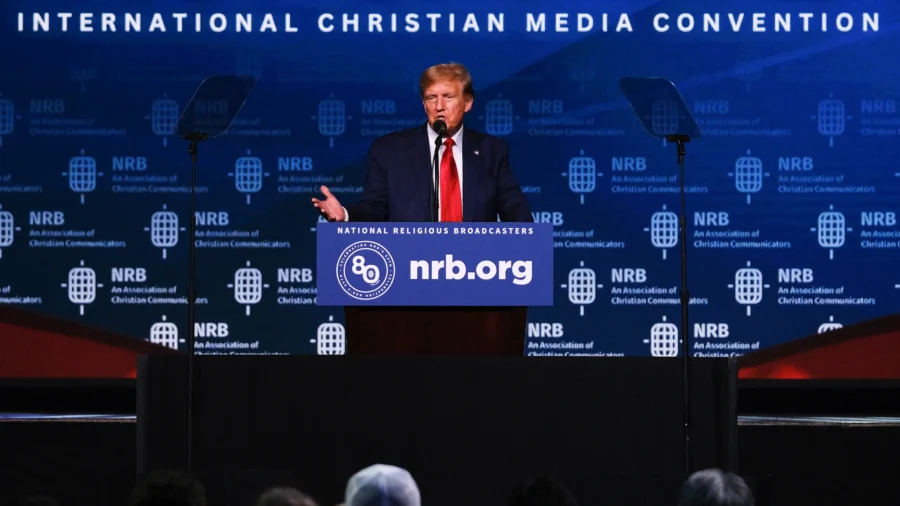Attorneys for former President Donald Trump on Thursday argued in court that his Florida classified documents case should dismissed because he has presidential immunity and should be shielded from prosecution.
In four motions to dismiss the indictment to U.S. District Judge Aileen Cannon, his lawyers wrote that the case should be dismissed and he should be shielded from criminal prosecution because he has presidential immunity.
They wrote that as commander-in-chief, President Trump had “unreviewable discretion” over the classified records in question. They also argued that under the Presidential Records Act, he could designate any government document as his own personal record.
Citing the indictment in which special counsel Jack Smith’s team wrote that the “‘genesis’ of this case dates back to at least ‘the tail end of the Trump Administration itself,’” they wrote that the case should be declared null and void that the indictment “makes clear that this decision and the related transportation of records occurred while President Trump was still in office.” Later, they argued that other presidents dating back to George Washington treated their presidential papers as their own personal property.
“President Trump exercised virtually unreviewable Article II executive authority to designate the records as personal when, as alleged in the Superseding Indictment, he ’caused’ the materials to be transported out of the White House while he was still in office,” his lawyers said, adding the was still president when “many of the documents at issue were packed (presumably by the [General Services Administration), transported, and delivered to Mar-A-Lago.”
Presidential Immunity
In the other motion, the former president argued that he left the White House on Jan. 20, 2021, and is alleged to have made these decisions concerning the classified documents while he was still president and, therefore, enjoys immunity from prosecution.
“Presidential immunity from criminal prosecution for official acts draws support directly from the text of the Constitution, as the Impeachment Judgment Clause states that a president cannot be criminally prosecuted unless he is first impeached and convicted by the U.S. Senate,” they wrote.
And, “without immunity from criminal prosecution, the President’s political opponents will seek to influence and control his or her decisions via de facto extortion or blackmail with the threat, explicit or implicit, of indictment by a future, hostile Administration, for acts that do not warrant any such prosecution,” they wrote.
President Trump’s lawyers in his Washington election case made similar arguments in two courts, with the District of Columbia’s Court of Appeals recently rejecting such claims. His team appealed that order to the U.S. Supreme Court earlier this month.
Appointment
Further, they wrote that special counsel Jack Smith’s appointment by the Department of Justice is a “serious problem,” suggesting he was improperly named to the position in his federal classified documents case.
The separate motion to Judge Cannon claimed Attorney General Merrick Garland’s appointment of Mr. Smith in late 2022 was unconstitutional because the Senate did not confirm his appointment, arguing that it violates the Constitution’s Appointments Clause and the Appropriations Clause.
His appointment is a “serious problem for the rule of law—whatever one may think of former President Trump or the conduct Smith challenges in the underlying case,” the filing reads.
Meanwhile, the Appointments Clause, which allows the president to nominate public officials with the confirmation of the Senate, “does not permit the Attorney General to appoint, without Senate confirmation, a private citizen and like-minded political ally to wield the prosecutorial power of the United States,” President Trump’s lawyers said. “As such, Jack Smith lacks the authority to prosecute this action,” they continued.
Mr. Smith’s role wasn’t established by law “under the Appointments Clause,” the lawyers argued, and the “authority he attempts to employ as Special Counsel far exceeds the power exercisable by a non-superior officer, authority that Congress has not cloaked him with.”
“Therefore,” his attorneys added, “any actions taken by Smith are ultra vires and the superseding indictment must be dismissed.”
In another section, they further stipulated that Mr. Smith’s expenditures are not part of the Justice Department’s budget, but he is instead being funded by the Biden administration “via the permanent indefinite appropriation that is only available to ‘independent counsel’ appointed pursuant to the Independent Counsel Act or ‘other law,’” it continued.
Last June, President Trump pleaded not guilty last June to dozens of criminal counts in connection to the case after federal prosecutors claimed he didn’t return classified documents that he had at his Mar-a-Lago resort in Florida. Before his indictment, his Florida residence was raided by FBI agents in an unprecedented incident, which the former president described as politically motivated.
A superseding indictment filed by Mr. Smith charged President Trump, aide Walt Nauta, and Mar-a-Lago staffer Carlos De Oliveira with multiple obstruction counts that alleged he tried to delete surveillance footage in 2022.
In 2022, Mr. Garland said that he had the authority to name him as special counsel in two cases against President Trump because he is the attorney general. He pointed to a law that allowed him to appoint officials to head investigations.
From The Epoch Times

